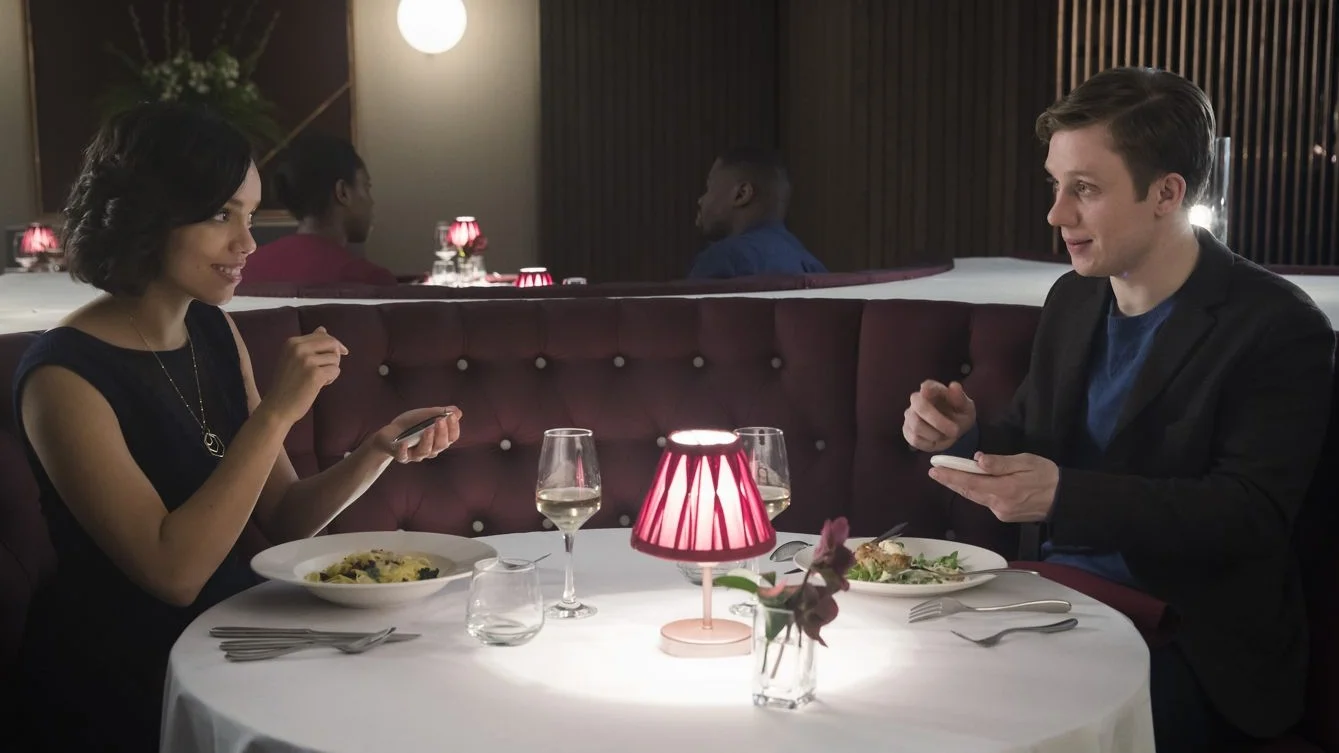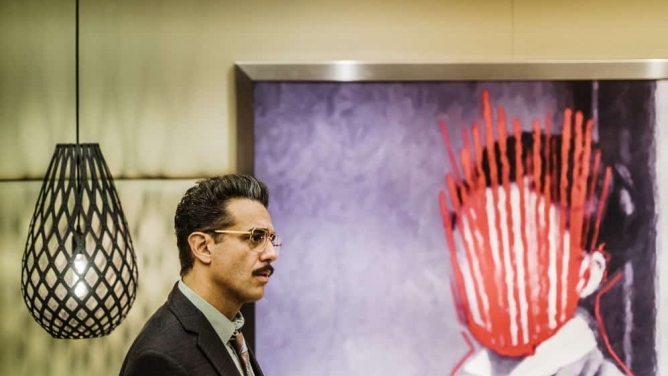TV Recap: Twin Peaks: The Return, Part 3 and Part 4
“Albert, I hate to admit this, but I don’t understand this situation at all.”
When Showtime announced that the third and fourth hours of the new Twin Peaks would be available on their app immediately after the first two aired, I was very confused. A double-length premiere is nothing out of the ordinary, but four hours at once? It sounded like an unwieldy amount of material to release simultaneously, and I wondered why the network would go out of their way to blow more of their stash than they had to. As the credits rolled on Part 4, however, I understood the strategy completely.
If any doubt lingered that Showtime gave David Lynch creative carte blanche, it would be banished by the opening quarter of Part 3. For an almost wordless fifteen minutes, Dale Cooper finds himself in a room by a purple sea with an eyeless woman who can only speak in static hiss. We can see that she is trying to warn him and he is trying to help her, but they’re stuck in a juddering stasis of miniature time loops, unable to communicate as fierce banging approaches from outside. Lynch captures a very specific variety of quasi-paralyzed dream state here that I’ve never seen on screen before (and which resembles a buffering video stream in a way that surely made Showtime executives antsy).
Cooper escapes the room and finds himself atop a steel box in space. The eyeless woman pulls a lever and is thrown into the void, just before a cameo by the late Don S. Davis as Garland Briggs, now an Eraserhead-like floating face. Cooper goes back inside the box to find a different woman (played, intriguingly, by Phoebe Augustine, who we know as Ronette Pulaski), who warns him (in classic Black Lodge backwards speech) that her mother is coming. “When you get there,” she says, “you will already be there.” He then exits through a giant electrical outlet. Whether this room was somewhere deeper within the Black Lodge, a place between the Red Room and reality, or something new and unfathomable, the sequence is pure “Twin Peaks, But More”. Take the Red Room, filter it through the past twenty-five years of Lynch’s career, subtract all network oversight, and you get the Purple Box.
From here, the show settles into something more closely resembling a traditional narrative, at least for a while, and at least by Lynch standards. Cooper’s exit affects his doppelganger, who wrecks his car and vomits a noxious mix of garmonbozia and black sludge, the very smell of which sends the cops who find him to the hospital. We meet Dougie Jones, yet another variation on Coop, who happens to have the dreaded Owl Cave ring on his rapidly-numbing hand. The real Cooper switches places with Dougie, who finds himself in the Red Room. Mike tells him he was “manufactured for a purpose that’s been fulfilled,” and he dissolves into a tiny golden orb. The idea that Black Lodge forces can create living things that don’t know they aren’t human is a new addition to the Twin Peaks lore with some pretty intense implications.
Mistaken for Dougie and unable to speak beyond mimicry after a quarter-century outside reality, Cooper wanders around as a hollow shell. The only clue to his identity is the key to his old room at the Great Northern, still in his pocket. Jade, a prostitute Dougie was with when the switch occurred, takes him to a casino, narrowly avoiding some assassins who are on his trail. The near-catatonic agent finds himself drawn to slot machines that pay out big jackpots, and begins sharing the wealth with his less fortunate fellow gamblers. It’s a charming and very cute sequence that’s especially refreshing after the strange darkness that has permeated the show so far. Coop’s heart is still trapped, but its warmth is returning slowly.
Meanwhile, Gordon Cole (now Deputy Director of the FBI) and Albert Rosenfield are receiving a briefing from Agent Tammy Preston (readers of Mark Frost’s Secret History of Twin Peaks will already be familiar with T.P.) about the murders at the glass box in New York. Cole receives a call informing him that the long-lost Dale Cooper has been found in South Dakota, and the trio sets out for the Black Hills. Before leaving, Cole visits his old friend, Denise Bryson, now Chief of Staff of the entire Federal Bureau of Investigation, about bringing the fledgling Agent Preston on this trip. It’s not my place to make any sort of comment on Denise as trans representation (there are a lot of takes from trans folks out there who feel all kinds of ways about her that are worth engaging with), but the warmth between her and Gordon is touchingly palpable. Cole’s statement that transphobes need to “fix their hearts or die” is something any good ally should take to heart. It feels important that this line was given to not just any character, but the one played by David Lynch himself. “Fix Your Hearts or Die” is the Word of God where Twin Peaks is concerned.
Cooper finds his way to Dougie’s home and improbably-named family. His wife, Janey-E (Naomi Watts, single-handedly lifting every scene she’s in, as always) admonishes him for missing their son, Sonny-Jim’s birthday party. But when she sees the bag full of money he’s returned from the casino with, she weeps with relief that they have enough “to pay them” now. The next morning, Cooper has a vision of Mike showing him the golden orb and telling him he’s been tricked. Then he re-learns how to pee.
The heart of Part 4 brings us back to the Twin Peaks Sheriff’s Station, where we watch Lucy struggle with the concept of cell phones, we meet the new Sheriff Truman (the brother of the ailing other Sheriff Truman), and we learn that Bobby Briggs has, hilariously, become a cop dedicated to keeping kids off drugs. Michael Cera steals the show by visiting as Andy and Lucy’s son, Wally Brando (a role many of us predicted the moment he appeared on the cast list), and delivering a bizarrely sweet monologue. The show reaches a turning point when Bobby walks in on Hawk’s investigation and begins weeping the moment he sees Laura’s photo. To this point, there’s been conspicuously little of Angelo Badalamenti’s trademark score, and to hear "Laura Palmer’s Theme" swell for the first time since Fire Walk With Me as Bobby’s memories come flooding back makes for an overwhelming moment of well-earned nostalgia.
Part 4 climaxes with our FBI heroes visiting what seems to be Cooper in a South Dakota prison. Speaking slowly and strangely, the doppelganger informs them he’s been working undercover for years with Phillip Jeffries. Gordon and Albert agree that Cooper doesn’t seem right, and admit that neither of them understands what’s happening. Albert confesses that he once cleared Jeffries to give Cooper some information about their “man in Columbia”, who turned up dead. We can’t be sure yet what Phillip Jeffries has been up to since we saw the southern-accented David Bowie vanish in Fire Walk With Me, but the fact that this admission leaves the always-chatty Gordon speechless is definitely a bad sign.
So, the four hours of Twin Peaks that debuted together after two years of intense secrecy leave us with the plot fully in motion. While the first two parts pulled us in and set a strange table, many fans who watched only those were, understandably, scratching their heads about when it would start to feel like Twin Peaks again. Keeping in mind that Lynch and Frost treated this season like an eighteen-hour movie, it makes perfect sense that we’re now in the thick of the first act. It was always the humor and heart that made the mysteries matter, and we’re now following that magic like a light in the woods. We’ve spent some time in New York and South Dakota and the Black Lodge, confronted the blood-splattered noir and thematic obfuscation of latter-career Lynch, but the purpose of this series is coming into focus. We’re on a journey back to Twin Peaks, not just the place and the people, but the feeling. Cooper has just tasted coffee for the first time since his return, while Cole and Albert have determined they need “one certain person” to take a look at this doppelganger. I have a definite feeling that we’re about to meet a woman with a very large collection of cassette tapes.
Andrew is co-hosting “Don’t Zap the Geek”, a podcast about the Twin Peaks revival, with JoJo Seames and Christa Lee. Follow them on Twitter at @AndrewIhla, @JoJoSeames, and @OhPoorPup to catch their in-depth discussions each week.































